Sesha and Garuda
Vishnu's
paradise, Vaikuntha, is the pivot of the cosmos. It stands on the ocean of
milk, radiant with golden spires, sparkling gems and bright banners. Here
Vishnu, ruler of the universe, holds court with Lakshmi by his side, ensuring
that dharma is respected by one and all.
When
order prevails, Vishnu rests in peace on the coils of Ananta-Sesha, the divine
serpent.
When
dharma is threatened, Vishnu rides into battle on the celestial bird Garuda to
set things right.
Kadru Enslaves Vinata
Sesha
and Garuda were both sons of Kashyapa, the celestial sage, by his wives Kadru
and Vinata.
Kadru,
mother of serpents, once said that Ucchaishrava, the divine stallion, had a
black tail.
Vinata,
mother of birds, believed the celestial horse was spotlessly white. She was so
confident that she chirped, "If you can prove that Ucchaishrava has even a
single black hair on its tail, I will be your slave."
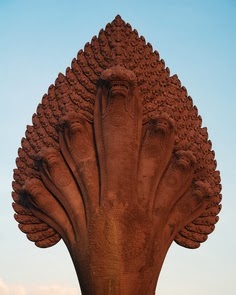 Kadru
secretly summoned her children and hissed, "Go and cling to the tail of
Ucchaishrava as it rides past the horizon at dawn tomorrow." The serpents
obeyed so that the next day, from afar, the divine horse appeared to have a
black tail.
Kadru
secretly summoned her children and hissed, "Go and cling to the tail of
Ucchaishrava as it rides past the horizon at dawn tomorrow." The serpents
obeyed so that the next day, from afar, the divine horse appeared to have a
black tail.
By
this deceit, Kadru won the wager and made Vinata her slave.
Sesha Becomes Vishnu's Throne
Sesha,
eldest of the serpents, did not approve of his Mother's trickery. He broke all
ties with his siblings and his conniving mother.
Sesha's
nobility so pleased Kashyapa that he said, "You will be the support of the
cosmos. Your mighty hood will be the foundation of the universe. On your coils
will rest the lord of the world, Vishnu himself."
Garuda Steals Amrita
Kadru
meanwhile demanded the elixir amrita as the price of Vinata's freedom.
So
the eagle Garuda, mightiest of Vinata's sans, swooped down upon Amravati, the
city of the gods, in search of the celestial drink. He found it in a well of
fire guarded by two huge dragons.
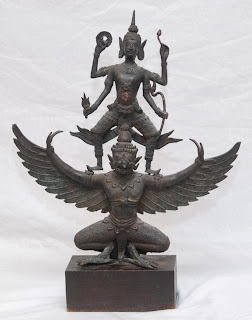 Garuda
flapped his great wings to put out the fire, pecked the dragons to death and
flew off with the pot of elixir. Indra tried to stop him with his dreaded
thunderbolt, the vajra, but it barely managed to singe one of the mighty bird's
feathers.
Garuda
flapped his great wings to put out the fire, pecked the dragons to death and
flew off with the pot of elixir. Indra tried to stop him with his dreaded
thunderbolt, the vajra, but it barely managed to singe one of the mighty bird's
feathers.
Garuda Tricks Kadru
Having
secured the release of his mother with the stolen nectar, Garuda told Kadru and
her sons, "You must not drink divine nectar with unwashed lips."
The
serpents saw sense in Garuda's advice. They rushed to a nearby river to wash
their mouths leaving the pot of nectar unguarded on the river bank.
While
they were away, Garuda summoned Indra to reclaim the pot of amrita and take it
back to the heavens.
Thus
did Garuda manage to free his mother without letting the serpents take a sip of
nectar.
Garuda Becomes Vishnu's Mount
"Why
did you not sip the amrita yourself?" asked Vishnu.
Garuda
replied, "I do not take what is not mine."
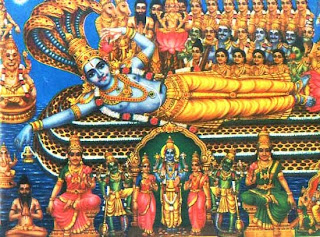 Pleased
with this reply, Vishnu said, "Your nobility matches your brawn and brain.
Would a worthy bird like you consider being my mount?"
Pleased
with this reply, Vishnu said, "Your nobility matches your brawn and brain.
Would a worthy bird like you consider being my mount?"
"Only
if you let serpents become my natural food," requested Garuda.
"So
be it," said Vishnu.
Garuda
became Vishnu's vahana and his insignia, appearing on the lord's banner.
Jaya and Vijaya
There
are seven gates round Vaikuntha. Those who renounce lust, anger, greed, pride,
attachment and envy can cross the first six. At the seventh stand the
doorkeepers Jaya and Vijaya permitting entry to only those who have transcended
the fear of death and the passion for life.
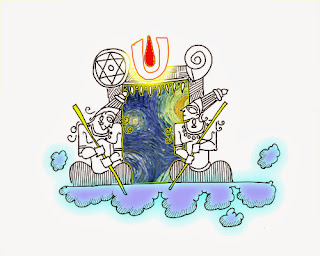 Sanaka,
Sananda, Sanatana and Sanatkumar, renounced the world as soon as they were born
and decided to go Vaikuntha. But they were stopped at the gates by Jaya and
Vijaya who said, "How can we let you enter, you who have had no taste of
life or death?"
Sanaka,
Sananda, Sanatana and Sanatkumar, renounced the world as soon as they were born
and decided to go Vaikuntha. But they were stopped at the gates by Jaya and
Vijaya who said, "How can we let you enter, you who have had no taste of
life or death?"
Three
times did the children try to enter Vaikuntha; three times they were stopped by
Jaya and Vijaya.
Piqued,
the four kumars cursed the divine doorkeepers, "You have, like demons,
blocked our spiritual journey into the abode of the lord. May you therefore
become asuras three times over."
Vishnu
rushed to the gates of Vaikuntha to console Jaya and Vijaya who were only doing
their duty. Said the lord, "Even as demons, you will be my gatekeepers,
embodying the six emotions that shut the doors of Vaikuntha. I will fight you,
destroy you and show man the road to my paradise."
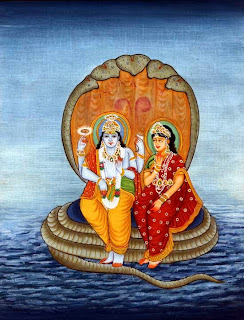 Jaya
and Vijaya were reborn as the lustful Hirartyaksha, the wrathful
Hiranyakashipu, the greedy Kartaviryarjuna, the proud Ravana, the obsessive
Kamsa and the jealous Sishupala who were killed by the lord in his incarnations
as Varaha, Narasimha, Parashurama, Rama and Krishna.
Jaya
and Vijaya were reborn as the lustful Hirartyaksha, the wrathful
Hiranyakashipu, the greedy Kartaviryarjuna, the proud Ravana, the obsessive
Kamsa and the jealous Sishupala who were killed by the lord in his incarnations
as Varaha, Narasimha, Parashurama, Rama and Krishna.
Vishnu-dootas Rescue Ajamila
Ajamila
lived a wanton life, drinking, gambling, disrespecting elders and neglecting
his family. As he lay dying, he called out to his son: "Narayana,
Narayana, please come here."
The
boy paid no heed to his father's request.
He
shouted again, "Narayana, Narayana, please come here." The boy still
did not come. And so Ajamila breathed his last, mumbling "Narayana,
Narayana."
Yama,
the god of death, decided that Ajamila who had done not one good deed in his
entire life should spend the rest of eternity suffering in hell.
As
his dreaded Yama-dootas rushed towards Ajamila's corpse to collect his soul,
they were stopped by Vishnu-dootas, the lord's angels who said, "By
chanting the name of Narayana in his last moments, Ajamila has performed one
pious act and must therefore be given a chance to redeem himself." -
The
two groups of divinities fought until the will of Vishnu prevailed. Ajamila was
allowed to be reborn.
In
gratitude, Ajamila spent his next life in piety, continence, charity and
reverence making up for all that he had done in his previous existence.
Ultimately he was given salvation, and allowed to reside in the blissful heart
of Vishnu.
The Quarrel-monger
Lute
in hand, chanting, "Narayana, Narayana," the divine sage Narada went
across the three worlds spreading rumours, causing rifts.
In
Vaikuntha, he would regale his lord Vishnu with his merry tales. "I described
Ahalya's beauty to Indra until he began lusting for that married woman...
Daksha hates Shiva after I reported how Shiva ridicules him ... I spoke about
Jamadagni's cow with so many superlatives that Kartaviryarjuna wants to steal
it now ... I made Shreedevi jealous of Bhoodevi ... I put the fear of death in
the heart of Kamsa . I praised the pompous Ravana into believing that he was
greater than the gods. . ."
"Why
do you do this, Narada?" asked Vishnu.
"Do
what?"
"Cause
so much trouble."
"I
don't do anything. I merely test their faith in you. If they were truly your
devotees, would any of them be lustful, wrathful, greedy, envious, frightened
or proud?"
Vishnu
burst out laughing and blessed his dearest devotee who kept chanting,
"Narayana, Narayana".
Narada Learns About Maya
 "The
world is my maya. He who accepts this, realises me," said Vishnu.
"The
world is my maya. He who accepts this, realises me," said Vishnu.
"What
is maya?" asked Narada.
"Before
I reply, will you fetch me some water?" requested the lord pointing to a
river.
Narada
did as he was told. But on his way back, he saw a beautiful woman. Smitten by
her beauty, he begged the woman to marry him. She agreed.
Narada
built a house for his wife on the banks of the river. She bore him many
children. Loved by his wife, adored by his sons and daughters, Narada forgot
all about his mission to fetch water for Vishnu.
In
time, Narada's children had children of their own. Surrounded by his
grandchildren, Narada felt happy and secure. Nothing could go wrong.
Suddenly,
the sky was covered with dark clouds. There was thunder, lightning, rain. The
river rose in flood, broke its banks and washed away Narada's house, drowning
everyone he loved, everything he possessed. Narada himself was swept away by
the river.
 "Help,
help. Somebody please help me," he cried. Vishnu immediately stretched out
his hand and pulled Narada out of the river.
"Help,
help. Somebody please help me," he cried. Vishnu immediately stretched out
his hand and pulled Narada out of the river.
Back
in Vaikuntha, Vishnu asked, "Where is my water?" "How can you be
so remorseless?
How
can you ask me for water when I have lost my entire family?"
Vishnu
smiled. "Calm down, Narada. Tell me, where did your family come from? From
me. Where has to gone? Into me. I am the only reality, the only entity in the
cosmos that is eternal and unchanging. Everything else is an illusion a mirage,
constantly slipping out of one's grasp. You, my greatest devotee, knew that.
Yet, enchanted by the pleasures of worldly life, you forgot all about me. You
deluded yourself into believing that your world and your life was all that
mattered, that nothing else was of any consequence. As far as you were
concerned the material world was infallible, invulnerable, perfect. That is
maya."
Writer Name:- Devdutt Pattanaik
 Kadru
secretly summoned her children and hissed, "Go and cling to the tail of
Ucchaishrava as it rides past the horizon at dawn tomorrow." The serpents
obeyed so that the next day, from afar, the divine horse appeared to have a
black tail.
Kadru
secretly summoned her children and hissed, "Go and cling to the tail of
Ucchaishrava as it rides past the horizon at dawn tomorrow." The serpents
obeyed so that the next day, from afar, the divine horse appeared to have a
black tail.  Garuda
flapped his great wings to put out the fire, pecked the dragons to death and
flew off with the pot of elixir. Indra tried to stop him with his dreaded
thunderbolt, the vajra, but it barely managed to singe one of the mighty bird's
feathers.
Garuda
flapped his great wings to put out the fire, pecked the dragons to death and
flew off with the pot of elixir. Indra tried to stop him with his dreaded
thunderbolt, the vajra, but it barely managed to singe one of the mighty bird's
feathers.  Pleased
with this reply, Vishnu said, "Your nobility matches your brawn and brain.
Would a worthy bird like you consider being my mount?"
Pleased
with this reply, Vishnu said, "Your nobility matches your brawn and brain.
Would a worthy bird like you consider being my mount?"  Sanaka,
Sananda, Sanatana and Sanatkumar, renounced the world as soon as they were born
and decided to go Vaikuntha. But they were stopped at the gates by Jaya and
Vijaya who said, "How can we let you enter, you who have had no taste of
life or death?"
Sanaka,
Sananda, Sanatana and Sanatkumar, renounced the world as soon as they were born
and decided to go Vaikuntha. But they were stopped at the gates by Jaya and
Vijaya who said, "How can we let you enter, you who have had no taste of
life or death?" Jaya
and Vijaya were reborn as the lustful Hirartyaksha, the wrathful
Hiranyakashipu, the greedy Kartaviryarjuna, the proud Ravana, the obsessive
Kamsa and the jealous Sishupala who were killed by the lord in his incarnations
as Varaha, Narasimha, Parashurama, Rama and Krishna.
Jaya
and Vijaya were reborn as the lustful Hirartyaksha, the wrathful
Hiranyakashipu, the greedy Kartaviryarjuna, the proud Ravana, the obsessive
Kamsa and the jealous Sishupala who were killed by the lord in his incarnations
as Varaha, Narasimha, Parashurama, Rama and Krishna.  "Help,
help. Somebody please help me," he cried. Vishnu immediately stretched out
his hand and pulled Narada out of the river.
"Help,
help. Somebody please help me," he cried. Vishnu immediately stretched out
his hand and pulled Narada out of the river. 
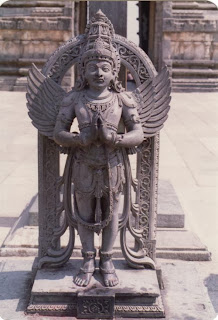
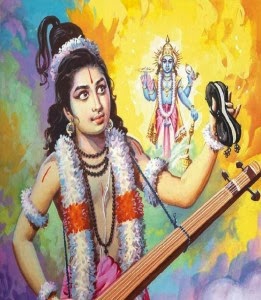











0 Response to "Companions of Vishnu"
Post a Comment